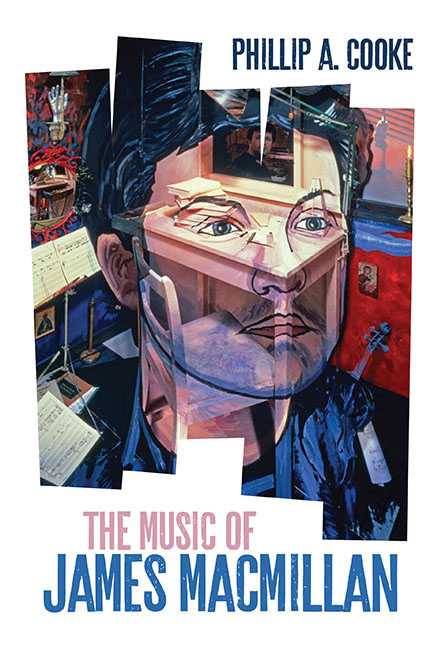Book contents
- Frontmatter
- Contents
- List of Plates
- List of Tables
- List of Music Examples
- Foreword
- Prologue
- Acknowledgements
- Permissions
- 1 The Keening – Cumnock, Edinburgh and Durham
- 2 The Tryst – Glasgow and the Road to Isobel Gowdie
- 3 Scots Songs – The Confession of Isobel Gowdie, Tuireadh and Veni, Veni, Emmanuel
- 4 A Different World – Visitatio Sepulchri, Seven Last Words from the Cross and Inés de Castro
- 5 Changed – Triduum and Quickening
- 6 Raising Sparks – ‘Scotland's Shame’, Politics and A Scotch Bestiary
- 7 A New Song – Mass and MacMillan 's Choral Renaissance
- 8 After Virtue – Symphony No. 3, The Sacrifice and the St John Passion
- 9 Serenity – Violin Concerto, Clemency and the St Luke Passion
- 10 Tu es Petrus – Bellahouston Park and the Return to Cumnock
- List of Works and Recordings
- Bibliography
- Index of Works by James MacMillan
- General Index
1 - The Keening – Cumnock, Edinburgh and Durham
Published online by Cambridge University Press: 31 August 2019
- Frontmatter
- Contents
- List of Plates
- List of Tables
- List of Music Examples
- Foreword
- Prologue
- Acknowledgements
- Permissions
- 1 The Keening – Cumnock, Edinburgh and Durham
- 2 The Tryst – Glasgow and the Road to Isobel Gowdie
- 3 Scots Songs – The Confession of Isobel Gowdie, Tuireadh and Veni, Veni, Emmanuel
- 4 A Different World – Visitatio Sepulchri, Seven Last Words from the Cross and Inés de Castro
- 5 Changed – Triduum and Quickening
- 6 Raising Sparks – ‘Scotland's Shame’, Politics and A Scotch Bestiary
- 7 A New Song – Mass and MacMillan 's Choral Renaissance
- 8 After Virtue – Symphony No. 3, The Sacrifice and the St John Passion
- 9 Serenity – Violin Concerto, Clemency and the St Luke Passion
- 10 Tu es Petrus – Bellahouston Park and the Return to Cumnock
- List of Works and Recordings
- Bibliography
- Index of Works by James MacMillan
- General Index
Summary
In a candid and somewhat brutal article in The Guardian in 2004 James MacMillan talks very openly and honestly about his childhood, growing up in working-class west Scotland in the 1960s. The article, entitled ‘Silence of the lambs’, vividly describes the religious divisions that were present at the time and the difficulties the young MacMillan found in a society ‘dominated by machismo, hard-drinking and sporadic violence’. The article, written in response to a new edition of Dennis Sewell's Catholics: Britain's Largest Minority, finds MacMillan reminiscing on what one can only imagine are difficult memories of animal cruelty and anti-Catholic bullying in his formative years. Though the article seems to revel in the portrayal of this cruelty (MacMillan certainly does not hold back in his description of the loose sheep that had wandered into a local estate to find its untimely end at the hands of the boys and their ‘sexually aroused Alsatians’) it does give a very personal insight into the composer's early years: his fears, his family, his education, his love of football and most importantly, his religion. In many ways, the article can be read as a metaphor for MacMillan's music: it is emotionally direct, heart-on-sleeve and has the beguiling mix of dramatic violence and tender consolation that are the hallmarks of the composer's mature works. Although ostensibly an article on religious divisions, it still finds space for warmth, humour and humanity and these are the characteristics that have helped to make James MacMillan one of the most successful British composers of recent years.
James Loy MacMillan was born in Kilwinning, Ayrshire, in south-west Scotland, on 16 July 1959, the first child of James MacMillan Senior (1931– 2019) and Ellen Loy (1935–2008). Both MacMillan's parents were from Ochiltree, a small village west of the larger settlement of Cumnock, and both attended the same school, St John's Roman Catholic Primary School, which MacMillan Junior would attend in the 1960s. James MacMillan Senior was a joiner and carpenter and it was whilst he was employed to carry out repair work at Drongan Primary School (another small village near Cumnock) in the mid-1950s that he met Ellen, who was a trainee teacher at the time. They married at St John's Church, Cumnock in 1958 and James MacMillan Junior was born a year later. Two further children were born in 1961 and 1964
- Type
- Chapter
- Information
- The Music of James MacMillan , pp. 1 - 20Publisher: Boydell & BrewerPrint publication year: 2019



